

L.A. Reid. Antonio Marquis "L.A.
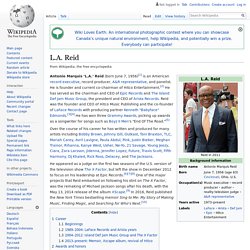
" Reid (born June 7, 1956)[1] is an American record executive, record producer, A&R representative, and panelist. He is founder and current co-chairman of Hitco Entertainment.[2] He has served as the chairman and CEO of Epic Records and The Island Def Jam Music Group, the president and CEO of Arista Records. Reid was the founder and CEO of Hitco Music Publishing and the co-founder of LaFace Records with producing partner Kenneth "Babyface" Edmonds.[3][4] He has won three Grammy Awards, picking up awards as a songwriter for songs such as Boyz II Men's "End Of The Road. "[5] Career[edit] Beginnings[edit] Franz Lachner.
Franz Paul Lachner (2 April 1803 – 20 January 1890) was a German composer and conductor.[1] Biography[edit] Lachner was born in Rain am Lech to a musical family (his brothers Ignaz, Theodor and Vinzenz also became musicians).
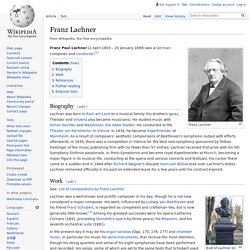
He studied music with Simon Sechter and Maximilian, the Abbé Stadler. He conducted at the Theater am Kärntnertor in Vienna. Sebastián Iradier. Sebastián Iradier Salaverri (Salaberri) (20 January 1809 – 6 December 1865),[1] or Sebastián Yradier, was a Spanish Basque composer.
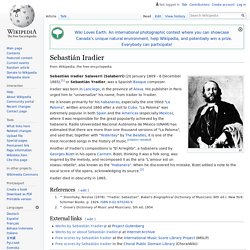
Iradier was born in Lanciego, in the province of Álava. His publisher in Paris urged him to "universalize" his name, from Iradier to Yradier. Iradier died in obscurity in 1865. Untitled. Eugène Arnold Dolmetsch (24 February 1858 – 28 February 1940), was a French-born musician and instrument maker who spent much of his working life in England and established an instrument-making workshop in Haslemere, Surrey.
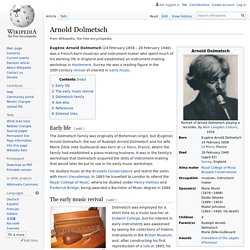
He was a leading figure in the 20th-century revival of interest in early music. Early life[edit] The Dolmetsch family was originally of Bohemian origin, but (Eugène) Arnold Dolmetsch, the son of Rudolph Arnold Dolmetsch and his wife Marie Zélie (née Guillouard) was born at Le Mans, France, where the family had established a piano-making business. It was in the family's workshops that Dolmetsch acquired the skills of instrument-making that would later be put to use in his early music workshops. The early music revival[edit] Untitled. John Jenkins (1592–1678), was an English composer who was born in Maidstone, Kent and who died at Kimberley, Norfolk.
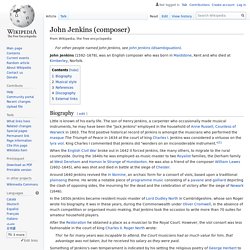
When the English Civil War broke out in 1642 it forced Jenkins, like many others, to migrate to the rural countryside. During the 1640s he was employed as music-master to two Royalist families, the Derham family at West Dereham and Hamon le Strange of Hunstanton. He was also a friend of the composer William Lawes (1602–1645), who was shot and died in battle at the siege of Chester.
Around 1640 Jenkins revived the In Nomine, an archaic form for a consort of viols, based upon a traditional plainsong theme. He wrote a notable piece of programme music consisting of a pavane and galliard depicting the clash of opposing sides, the mourning for the dead and the celebration of victory after the siege of Newark (1646). Untitled. Manuscript of "I Rise and Grieve", in Lawes's hand[note 1] Henry Lawes (1596 – 1662) was the leading English songwriter of the mid-17th century.[1] He was elder brother of fellow composer William Lawes.
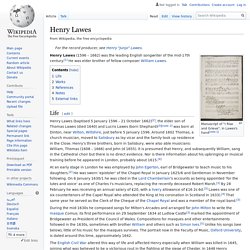
Life[edit] Henry Lawes (baptised 5 January 1596 – 21 October 1662)[2], the elder son of Thomas Lawes (died 1640) and Lucris Lawes (born Shephard)[3][note 2] was born at Dinton, near Wilton, Wiltshire, just before 5 January 1596. Around 1602 Thomas, a church musician, moved to Salisbury as lay vicar and the family took up residence in the Close. Untitled. English composer and musician "She Weepeth Sore in the Night", four voice round Play For the missionary who lived from 1839 to 1907, see William George Lawes.
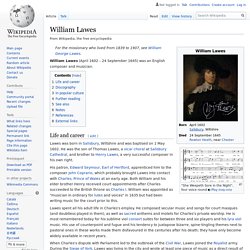
William Lawes (April 1602 – 24 September 1645) was an English composer and musician. Charles Calello. Charles Calello (born August 24, 1938) is an American singer, composer, conductor, arranger and record producer born in Newark, New Jersey.
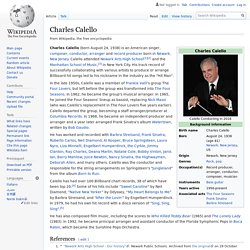
Calello attended Newark Arts High School[1][2] and the Manhattan School of Music,[3] in New York City. His track record of successfully collaborating with various artists to produce or arrange Billboard hit songs led to his nickname in the industry as the "Hit Man". Felip Pedrell. Felip Pedrell Sabaté (Spanish: Felipe) (19 February 1841 – 19 August 1922) was a Spanish composer, guitarist and musicologist.
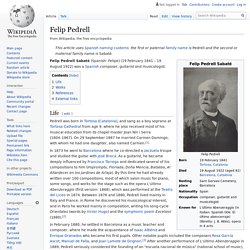
Life[edit] Ernst Reijseger. Antonio Soler. Antonio Francisco Javier José Soler Ramos, usually known as Padre ('Father', in the religious sense) Antonio Soler, known in Catalan as Antoni Soler i Ramos (baptized 3 December 1729 – died 20 December 1783) was a Spanish composer whose works span the late Baroque and early Classical music eras.
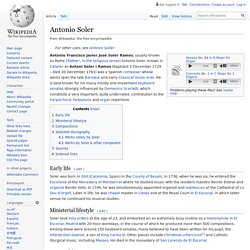
He is best known for his many mostly one-movement keyboard sonatas strongly influenced by Domenico Scarlatti, which constitute a very important, quite underrated, contribution to the harpsichord, fortepiano and organ repertoire. Rockin' the Joint - Esquerita. The Esquerita volume of the Capitol Collectors Series reissued a whopping 28 sides by the rock & roll wildman, recorded over 1958-1959. These constituted his complete output for the label, not to mention the most unhinged recordings of his career. When this CD was originally released in 1990, ten of the songs had never before seen release in the U.S., appearing only on a double-LP set released in France. As such, it's the definitive look at Esquerita's recording career, and a necessary purchase for anyone interested in what made early rock & roll seem so dangerous. There's never much doubt as to what Esquerita is really singing about on songs like "Gettin' Plenty of Lovin'" or "Hey Miss Lucy," and the wild voodoo-jungle sound of "Esquerita and the Voola" must have sounded like Satan himself was about to storm out of the speakers.
Album Discography. Roger Sacheverell Coke. Roger Sacheverell Coke ( ("cook"); 20 October 1912, Alfreton, Derbyshire – 23 October 1972) was an English composer and pianist. Life[edit] Roger Sacheverell Coke was from a wealthy family. John Hartford. Life[edit] Harford (changed his name to Hartford later in life at the behest of Chet Atkins)[4] was born on December 30, 1937, in New York City to parents Carl and Mary Harford. He spent his childhood in St. Louis, Missouri, where he was exposed to the influence that shaped much of his career and music: the Mississippi River. From the time he got his first job on the river, at age 16, Hartford was on, around, or singing about the river.
His early musical influences came from the broadcasts of the Grand Ole Opry, and included Earl Scruggs, nominal inventor of the three-finger bluegrass style of banjo playing. Heberto Padilla. Heberto Juan Padilla (20 January 1932 – 25 September 2000) was a Cuban poet, and the center of the so-called "Padilla affair" when he was imprisoned for criticizing the government.[1] He was born in Puerta de Golpe, Pinar del Río, Cuba. His first book of poetry, Las rosas audaces (The Audacious Roses), was published in 1949. After his first marriage to Bertha Hernandez with whom he had three children, Giselle, Maria and Carlos Padilla, he married poet Belkis Cuza Malé in 1972. His son, Ernesto Padilla, was born in 1972. Padilla's Imprisonment[edit] Although Padilla initially supported the revolution led by Fidel Castro, by the late 1960s he began to criticize it openly and in 1971, he was imprisoned by the Castro regime.[2] Padilla began to get frustrated with the growing government interference in cultural affairs.
Graeme Thomson. Tristan Gianola. Marion Scott (musicologist) Peter La Farge. Album Discography. Dodo's Bounce - Dodo Marmarosa. Dodo Marmarosa was one of the most brilliant pianists of the classic bebop era. If he had not had emotional problems that largely forced him off the scene after 1950, he would have become an influential force, extending the innovations of Bud Powell.
This generous 30-song CD is a real gap filler for much of the music from the five sessions had not been reissued in many years. Marmarosa is heard on four unaccompanied solos (including his two-part impressionistic "Tone Paintings"); on five numbers in a trio with bassist Harry Babasin (who doubles on cello) and drummer Jackie Mills; ten selections with guitarist Barney Kessel and bassist Gene Englund; and on six tunes in a quartet with tenor saxophonist Lucky Thompson, bassist Red Callender, and drummer Jackie Mills. In addition, there are five alternate takes from the Babasin date. Thompson provided four originals and there are five standards; the other 21 numbers are the pianist's compositions. Folk Songs for Far Out Folk. 1959 studio album by Fred Katz. Scratch Messiah. Such performances have become a tradition among music lovers in the English-speaking world, especially around Christmas time, and appear to be developing a following in the Netherlands and China as well[citation needed].
Often a "Sing-along Messiah" is organised in a concert hall or church, where a choir has rehearsed the music, but the public are invited to bring scores and join in. On a smaller scale, a Messiah party may take the form of a group of friends gathered around the piano in someone's home, and this is typically sung entirely a prima vista. Usually these are informal events, though occasionally there is a dress code: formal concert dress or even 18th century period costume.[1] Frequently these events are held during Advent, and often they are associated with fund-raising for charitable purposes.
The Phyiscal Basis Of Music by Edwin Jaynes. Georg Joseph Vogler. Justin Heinrich Knecht. Antony Hopkins. Girolamo Frescobaldi. Gaspar Cassadó. Donald Harrison. Donald Harrison Jr. Sangeeta Sudha. Nadezhda Rimskaya-Korsakova. Edmond Dédé. Francis Johnson (composer)